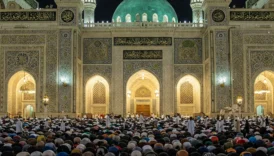Is Donating Qurbani Permissible In Islam?
Summary: Donating money instead of sacrificing does not fulfill the Qurbani worship. However, donating the sacrificial animal or its value through agency (wakalah) to trustworthy individuals/organizations for slaughter is permissible and fulfills the Qurbani. Intention and agency conditions are important.
- Is Donating Qurbani Permissible In Islam?
- Meaning And Importance Of The Qurbani Worship
- Is Donating The Money Instead Of Sacrificing Permissible?
- Qurbani's Meaning Beyond A Financial Worship
- Difference Between Charity (Sadaqah) And Qurbani Worship
- Donating Qurbani Through Agency (Wakalah)
- What Is Agency (Wakalah) And Its Conditions?
- Validity Of Qurbani Sacrifice Through Agency
- Giving Agency Through Trustworthy Organizations
- Points To Consider In Qurbani Donation
- Importance Of Intention (Niyyah)
- Trustworthiness Of The Agent (Wakil)
- Ensuring Sacrifice Meets Qurbani Conditions
- Relevant Verses (Ayat) And Hadiths
- Evidence Encouraging Qurbani Worship
- The Place Of Intention In Deeds
- View Of The Turkish Directorate Of Religious Affairs (Diyanet)
- Final Thoughts
- Bibliography
Meaning And Importance Of The Qurbani Worship
First and foremost, we need to correctly understand what Qurbani is and its place in the religion of Islam. Qurbani is not merely a social welfare activity consisting of distributing meat or helping the poor. Qurbani is, above all, a financial act of worship (ibadah). It signifies sacrificing animals that meet specific conditions, at a specific time (during the days of Eid al-Adha), according to the prescribed method, with the intention of drawing closer to Allah Almighty (qurbiyyah), submitting to His command (ita’ah), expressing gratitude for His blessings, and commemorating the submission of Prophet Ibrahim (Abraham) and his son Prophet Ismail (Ishmael) (peace be upon them) to Allah.
In the Holy Quran, our Lord commands:
فَصَلِّ لِرَبِّكَ وَانْحَرْ
Fasalli lirabbika wanhar.
“Therefore, turn in prayer to your Lord and sacrifice (to Him only).” (Al-Kawthar, 108:2)
In another verse, sacrificial animals are mentioned as among the symbols of Allah:
وَالْبُدْنَ جَعَلْنَاهَا لَكُمْ مِنْ شَعَائِرِ اللَّهِ لَكُمْ فِيهَا خَيْرٌ فَاذْكُرُوا اسْمَ اللَّهِ عَلَيْهَا صَوَافَّ فَإِذَا وَجَبَتْ جُنُوبُهَا فَكُلُوا مِنْهَا وَأَطْعِمُوا الْقَانِعَ وَالْمُعْتَرَّ كَذَلِكَ سَخَّرْنَاهَا لَكُمْ لَعَلَّكُمْ تَشْكُرُونَ
Walbudna ja’alnaha lakum min sha’a’irillahi lakum feeha khayr(un) fazkuroosmallahi ‘alayha sawaff(a) fa’iza wajabat junoobuha fakuloo minha wa at’imulqani’a walmu’tarr(a) kadhalika sakhkharnaha lakum la’allakum tashkuroon(a)
“And the camels and cattle We have appointed for you as among the symbols of Allah; for you therein is good. So mention the name of Allah upon them when lined up [for sacrifice]; and when they are [lifeless] on their sides, then eat from them and feed the needy who does not ask [in embarrassment] and the needy who asks. Thus have We subjected them to you that you may be grateful.” (Al-Hajj, 22:36)
These verses and the practices (Sunnah) of the Prophet Muhammad (peace be upon him) show that offering the Qurbani sacrifice is an important act of worship required of Muslims who have the financial means. According to the Hanafi school of thought, offering Qurbani is wajib (obligatory), while according to most other schools, it is sunnah mu’akkadah (emphasized Sunnah). Regardless of its ruling, the spirit of Qurbani encompasses submission to Allah, sacrifice, and sharing.
Is Donating The Money Instead Of Sacrificing Permissible?
This is one of the frequently asked questions today: “If I donate the money equivalent to the cost of a Qurbani animal to a poor person or a charity organization instead of sacrificing, have I fulfilled the Qurbani worship?”
According to Islamic jurisprudence (fiqh), the answer to this question is no. For the Qurbani worship to be considered fulfilled, it is essential that an animal meeting the specified conditions is slaughtered for the sake of Allah during the days of Eid al-Adha. The shedding of the animal’s blood (iraka al-dam) is a fundamental element (rukn) of this worship. Therefore, giving the money equivalent of the sacrificial animal or donating a non-sacrificial animal as charity (sadaqah), however virtuous an act it may be, does not substitute for the Qurbani worship itself. (Al-Kasani, Bada’i’, V, 67; Ibn Abidin, Radd al-Muhtar, IX, 454)
Qurbani’s Meaning Beyond A Financial Worship
Qurbani is not solely aimed at distributing meat to the poor. Of course, the distribution of meat and the aspect of social solidarity are very important and encouraged. However, the essence of the worship lies in sacrificing a living being in the name of Allah, following His command. This act symbolizes the submission of Prophet Ibrahim (pbuh), his willingness to give up what was dearest to him for Allah’s sake. When offering the sacrifice, a Muslim should also intend to sacrifice their own negative egoistic feelings, selfishness, and excessive attachment to worldly things. As stated in the verse:
لَنْ يَنَالَ اللَّهَ لُحُومُهَا وَلَا دِمَاؤُهَا وَلَكِنْ يَنَالُهُ التَّقْوَى مِنْكُمْ كَذَلِكَ سَخَّرَهَا لَكُمْ لِتُكَبِّرُوا اللَّهَ عَلَى مَا هَدَاكُمْ وَبَشِّرِ الْمُحْسِنِينَ
Lan yanalAllah luhoomuha wala dima’uha walakin yanaluhuttaqwa minkum kadhalika sakhkharaha lakum litukabbiroollaha ‘ala ma hadakum wabashshirilmuhsineen(a)
“Their meat will not reach Allah, nor will their blood, but what reaches Him is piety from you. Thus have We subjected them to you that you may glorify Allah for that [to] which He has guided you; and give good tidings to the doers of good.” (Al-Hajj, 22:37)
This verse emphasizes that the spiritual dimension, namely piety (taqwa) and devotion to Allah, is primary, rather than the physical aspect of the sacrifice. Donating money does not fully reflect this symbolic meaning and the spirit of the worship.
Difference Between Charity (Sadaqah) And Qurbani Worship
In Islam, helping the poor and needy, i.e., giving charity (sadaqah), is a very important act of worship with great rewards. However, every act of worship has its specific form, conditions, and wisdom. Just as fasting cannot replace prayer, or Hajj cannot replace Zakat, giving charity cannot replace the Qurbani worship. A Muslim who is obligated to offer Qurbani must sacrifice the animal to fulfill this duty. If they also wish to help the poor, they can give any amount of charity separately from the Qurbani funds, which would be a separate source of reward for them.
Donating Qurbani Through Agency (Wakalah)
So, what should individuals do if they do not have the means to sacrifice the animal themselves or wish for the meat to reach more needy people? This is where Islamic law provides a facilitation and solution: offering Qurbani through agency (wakalah).
Wakalah means appointing someone else to act on one’s behalf in a matter that one is authorized to perform. The Qurbani worship can also be performed through wakalah. This means that a person obligated to offer Qurbani can authorize another person or an organization to sacrifice or have the animal sacrificed on their behalf. (Al-Mawsili, al-Ikhtiyar, IV, 255)
What Is Agency (Wakalah) And Its Conditions?
For the Qurbani agency to be valid (sahih), certain conditions must be met:
- Appointment of Agent (Permission): The owner of the Qurbani must explicitly give permission (authorize) the person or organization appointed as the agent (wakil) to perform the sacrifice. This permission can be verbal, or as is common today, written or electronic. What matters is that the owner’s consent and intention reach the agent.
- Competence of the Agent: The appointed person or organization must be competent and trustworthy to perform or arrange the sacrifice according to Islamic rules.
- Intention (Niyyah): Both the owner (muwakkil) and the agent (wakil) must have the intention that this act is a Qurbani worship performed for the sake of Allah. The agent must sacrifice the animal on behalf of the owner.
- Specification: When giving agency, the type of animal to be sacrificed (sheep, goat, cattle, etc.) and on whose behalf it is being sacrificed should be specified. Especially in agencies given to organizations, the owner’s name and the information that the sacrifice will be performed during the days of Eid are important.
- Ownership: In sacrifice through agency, the agent purchases the sacrificial animal on behalf of the principal (owner) or slaughters the animal purchased by the principal. It is essential that the ownership of the animal belongs to the person giving the agency or is acquired on their behalf. When done through organizations, the organization purchases and sacrifices the animal on behalf of the donor.
Validity Of Qurbani Sacrifice Through Agency
Provided the above conditions are met, offering Qurbani through agency is permissible (ja’iz), and the Qurbani worship is considered fulfilled. Although it is more virtuous for a person to sacrifice the animal themselves or be present during the sacrifice, giving agency is a valid method. It is a great convenience, especially for those living abroad, those who do not wish to handle the sacrificing process themselves, or those who want the meat to be distributed to the needy in a more organized manner.
Giving Agency Through Trustworthy Organizations
Today, many non-governmental organizations (NGOs) and charities organize Qurbani sacrifices through agency. These organizations sacrifice the animals of the donors according to Islamic rules and distribute the meat to needy people domestically or internationally (especially in regions like Africa and Asia).
The most crucial aspect when donating Qurbani this way is the trustworthiness of the organization given the agency. One should investigate whether the organization performs the sacrifices according to Islamic conditions, adheres to the terms of agency, and is transparent and accountable. Established and audited organizations like the Turkiye Diyanet Foundation or other reliable charities with long-standing activity and strong references can be preferred.
Points To Consider In Qurbani Donation
Whether performed personally or through agency, certain points should be considered in the Qurbani worship:
Importance Of Intention (Niyyah)
As in all acts of worship, intention is fundamental in Qurbani. For our deeds to have value in the sight of Allah, our intention must be sincere (khalis), meaning it should be solely for the pleasure of Allah. Prophet Muhammad (peace be upon him) said:
إِنَّمَا الأَعْمَالُ بِالنِّيَّاتِ، وَإِنَّمَا لِكُلِّ امْرِئٍ مَا نَوَى
Innamal a’malu binniyyat wa innama likullimri’in ma nawa.
“Actions are judged only by intentions, and every person will have only what they intended.” (Bukhari, Bad’ al-Wahy, 1; Muslim, Imarah, 155)
When sacrificing or giving agency, our intention should be to obey Allah’s command, draw closer to Him, and express gratitude. Show-off, fulfilling a mere custom, or other worldly purposes corrupt the spirit of the worship.
Trustworthiness Of The Agent (Wakil)
If we are giving agency, we must have reasonable confidence that the person or organization we appoint will perform the task properly. If the agent is negligent or acts contrary to Islamic rules, the Qurbani worship may not be fulfilled. Therefore, research and certainty are important.
Ensuring Sacrifice Meets Qurbani Conditions
The animal to be sacrificed must be eligible for Qurbani (having reached a certain age, free from defects, etc.), the sacrifice must take place during the days of Eid (first three days according to Hanafis), and the name of Allah must be mentioned (Bismillah) during slaughter. These conditions must also be met in sacrifices performed through agency. Trustworthy organizations are meticulous about fulfilling these requirements.
Relevant Verses (Ayat) And Hadiths
The legitimacy and importance of the Qurbani worship are established by the Quran and Sunnah.
Evidence Encouraging Qurbani Worship
- Surah Al-Kawthar, Verse 2: “Therefore, turn in prayer to your Lord and sacrifice (to Him only).” This verse shows Qurbani is a direct command from Allah.
- Surah Al-Hajj, Verse 34: “…And for every nation We have appointed rites [of sacrifice] that they may mention the name of Allah over what He has provided for them of [sacrificial] animals…” This verse indicates Qurbani is a deep-rooted act of worship present in previous nations as well.
- Surah Al-Hajj, Verses 36-37: These verses emphasize that sacrificial animals are among the symbols of Allah and that it is piety, not the meat or blood, that reaches Him.
- Practices of the Prophet (pbuh): The Messenger of Allah (pbuh) offered Qurbani every year after migrating to Medina (Tirmidhi, Adahi, 11) and emphasized its importance. In one hadith, he is reported to have said, “Whoever has the means to offer sacrifice but does not do so, let him not approach our place of prayer.” (Ibn Majah, Adahi, 2; Ahmad b. Hanbal, al-Musnad, II, 321). Although the authenticity of this specific hadith is debated, its general meaning is considered by scholars to highlight the significance of the act.
The Place Of Intention In Deeds
The hadith “Actions are judged only by intentions” (Bukhari, Bad’ al-Wahy, 1; Muslim, Imarah, 155), mentioned earlier, shows that intention is decisive in all acts of worship, including Qurbani.
View Of The Turkish Directorate Of Religious Affairs (Diyanet)
The High Council of Religious Affairs of the Turkish Directorate of Religious Affairs (Diyanet) clearly states that Qurbani is fulfilled by sacrificing the animal itself, not by donating money, but it can be performed through agency:
“For the Qurbani worship to be valid, the person must either slaughter their sacrifice themselves or have it slaughtered through agency (wakalah). The Qurbani worship is not fulfilled by donating the monetary value of the sacrifice or the sacrificial animal itself to the poor or charities… A person wishing to have their Qurbani sacrificed via agency can appoint someone domestically or abroad, or an organization (like the Turkiye Diyanet Foundation, for example) as their agent. The agent must purchase the animal on behalf of the person giving agency or slaughter it on their behalf.” (Decisions of the High Council of Religious Affairs)
This view aligns with the general consensus of Islamic scholars.
Final Thoughts
My dear brother/sister, offering Qurbani is an important act of worship performed with wealth, carrying deep meanings. Shedding the animal’s blood is essential for this worship to be fulfilled. Therefore, donating money instead of sacrificing does not fulfill the obligation of Qurbani. However, for those who cannot sacrifice the animal themselves or wish for its meat to reach those more in need, offering Qurbani through agency (wakalah) is a valid and beautiful path provided by our religion. What is important is that our intention is sincere when giving agency, the person or organization we appoint is trustworthy, and the sacrifice is performed according to Islamic guidelines. May Allah make our intentions sincere, accept our sacrifices, and allow us all to benefit from the blessings of this sacred worship. Amin.
Bibliography
- The Holy Quran, Surah Al-Kawthar (108:2), Surah Al-Hajj (22:34, 36, 37).
- Al-Bukhari, Muhammad ibn Ismail. Sahih al-Bukhari, Bad’ al-Wahy (1).
- Muslim, ibn al-Hajjaj. Sahih Muslim, Imarah (155).
- Al-Tirmidhi, Muhammad ibn ‘Isa. Jami’ al-Tirmidhi, Adahi (11).
- Ibn Majah, Muhammad ibn Yazid. Sunan Ibn Majah, Adahi (2).
- Ahmad b. Hanbal. al-Musnad.
- Al-Kasani, Abu Bakr ibn Mas‘ud. Bada’i’ al-Sana’i’ fi Tartib al-Shara’i’. Beirut, 1997.
- Al-Mawsili, Abdullah b. Mahmud b. Mawdud. al-Ikhtiyar li-Ta’lil al-Mukhtar. Beirut, 1999.
- Ibn Abidin, Muhammad Amin. Radd al-Muhtar ‘ala al-Durr al-Mukhtar. Beirut, 1992.
- High Council of Religious Affairs (Diyanet İşleri Başkanlığı, Turkey). Fatwas regarding Qurbani (Accessible through their website and publications).
(Note: References for Hadith and Fiqh sources are based on standard, generally accepted classifications. Minor variations may exist in different prints and editions.)
Views: 0





